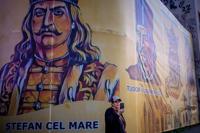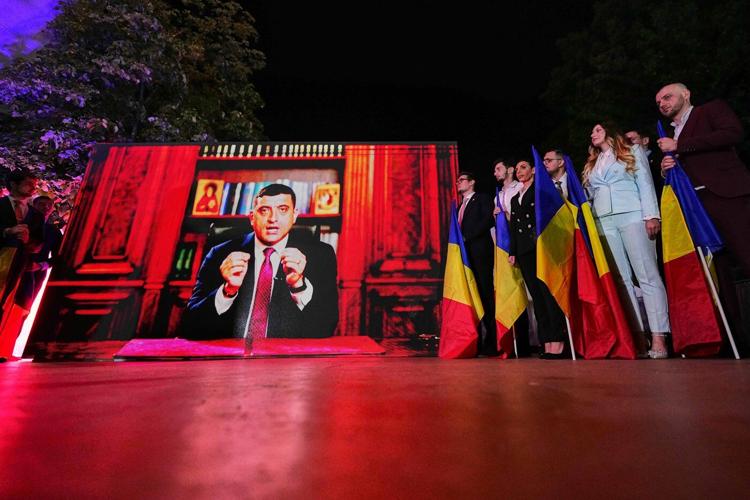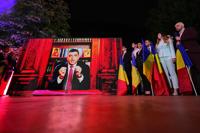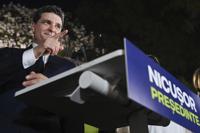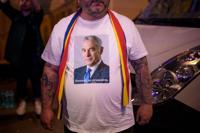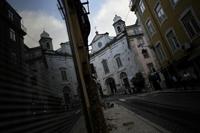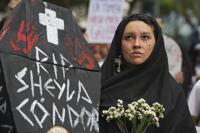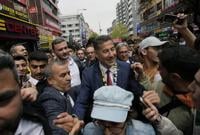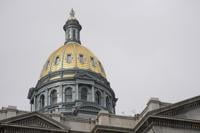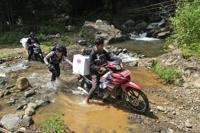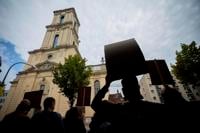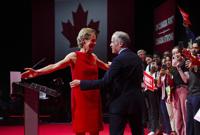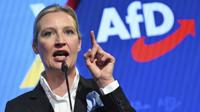BUCHAREST, Romania (AP) — George Simion, a nationalist and vocal supporter of U.S. President Donald Trump, won Romania’s first-round presidential election redo by a landslide after capitalizing on widespread anti-establishment sentiment.
The 38-year-old leader of the hard-right Alliance for the Unity of Romanians, or AUR, will face a pro-Western reformist in a May 18 runoff that could reshape the European Union and NATO member country’s geopolitical direction.
Romania’s political landscape was upended last year when a top court voided the previous election in which the far-right topped first round. The decision followed allegations of , which Moscow has denied.
“For 35 years, the Romanian people lived the lie that we are a democratic country,” Simion, who came fourth in last year’s race and later backed Georgescu, told The Associated Press last week. “And now the people are awakening.”
Who is George Simion?
Born in 1986 in Romania's eastern city of Focsani, Simion took a bachelor’s degree in business and administration in Bucharest, and later a master’s degree at a university in the northeastern city of Iasi researching communist-era crimes. He also became involved in soccer ultra groups.
He took part in civic activism, including joining a protest movement against a by a ��ɫtv company in a mountainous western region of Romania that contains some of Europe’s largest gold deposits. He also campaigned for reunification with neighboring Moldova.
In 2019, Simion founded the AUR party, which rose to prominence in a 2020 parliamentary election by proclaiming to stand for “family, nation, faith, and freedom,” and has since doubled its support to become Romania’s second largest party in the legislature. It opposes same-sex marriage and has close ties to the Romanian Orthodox Church.
Simion supports Trump and told AP last week that the AUR party is “perfectly aligned with the MAGA movement,” referring to the U.S. president's Make America Great Again movement.
What does the MAGA-style populist stand for?
Simion’s political platform has been built on a fiercely anti-establishment agenda and populist rhetoric. During the COVID-19 pandemic, his party , capitalizing on a widespread distrust of the authorities.
He labelled the canceled election last year a “coup d'etat,” and adopted stronger populist rhetoric and religious messaging to tap into Georgescu’s electorate. He has branded Romania’s current political system as a “hybrid regime” that failed to deliver democracy after the 1989 revolution toppled communism.
“They voted for the change, and they were not allowed to make this change,” he told the AP. “This is why I’m running again as a duty towards democracy, towards the constitutional order, to restore the rule of law, to restore the will of the Romanian people.”
A Simion presidency would pose unique foreign policy conundrums. His activities in Moldova led to an expulsion and multiple entry bans on allegations of trying to destabilize the country. He is also banned from entering neighboring Ukraine for “systemic anti-Ukrainian” activities. “It is in their interest to have good relations with us,” he said of the two countries.
In March, Simion sparked controversy after remarking during a protest that those responsible for barring Georgescu's second bid for presidency should be “skinned in a public square,” prompting prosecutors to launch a criminal probe for inciting violence. He denied the accusation saying it was a political metaphor.
What is his stance on the EU and NATO?
Observers have long viewed him of being pro-Russian and warn that his presidency would undermine both Brussels and NATO as the war rages on in Ukraine. He refuted the accusations as a “smear campaign” by leftists and said Russia has been the “main threat” to Romania in the last 200 years and remains so today.
“This is why we need a strong NATO and we need troops on the ground in Romania, in Poland and in the Baltic states,” he said, although he was against sending further military aid to Ukraine.
“The danger is not who will be the next president of Romania but … those who want to create a distance and to form two different opposing geopolitical blocs" between the European Union and the U.S., he said.
On the EU, Simion said, “We want more power to the 27 states, not toward the European institutions,” and that he is “totally aligned” with the position of Italian Prime Minister Giorgia Meloni, who was the only EU head of government to attend Trump's inauguration in January.
What do his critics say?
Siegfried Muresan, a Romanian member of the European Parliament, said Monday that a Simion presidency would be “bad news” for Romania and Europe, and accused the AUR leader of having ”disdain for democratic processes.”
“George Simion is not a conservative politician. He is an anti-European extremist. His election would endanger Romania, threaten European stability, and serve as a strategic victory for Russia,” he said. “He offers no viable solutions to Romania’s challenges.”
For Claudiu Tufis, an associate professor of political science at the University of Bucharest, accusations that Simion is extremist or pro-Russian are overblown. He says a Simion presidency could look similar to Hungary's Prime Minister Viktor Orbán, who has long been a thorn in the side of Brussels.
“My main criticism has to do first with his values. He’s a strong opponent of any sort of what people are considering to be identity politics, so he’s going to push back very hard on LGBT issues and gender issues,” Tufis told AP.
He added that Simion lacks a strong team to deal with major crises. “When it comes to dealing with geopolitical crisis, they are completely unauthorly unprepared,” he said.


